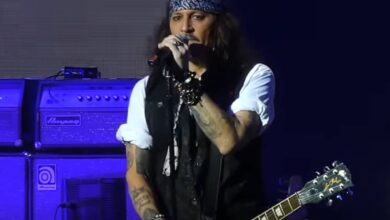Grandpa Nails “Stairway to Heaven” Solo with Unbelievable Precision
Alexander Konovalov’s viral video titled “Stairway to Heaven Led Zeppelin Solo Cover” has become one of those rare performances that feel both modern and timeless. With just his guitar, an amp, and a steady camera, he managed to recreate one of the most iconic solos in rock history—note for note, breath for breath. The clip is short, simple, and yet hypnotic, drawing millions of viewers who claim it’s the closest anyone has come to Jimmy Page’s legendary tone and phrasing.
From the moment the camera fades in, the viewer knows this isn’t about flash or filters. The shot stays tight on the fretboard, every movement deliberate and clear. There’s no lighting setup, no dramatic angles—just Konovalov’s hands and a guitar that speaks. The tone rings clean and warm, letting each note breathe in a way that mirrors the emotional rise and fall of Page’s original solo from 1971. It feels like being invited into a quiet room where history is being respectfully re-spoken.
What sets this cover apart is its precision. Konovalov doesn’t just replicate the solo; he internalizes it. Each bend lands exactly where it should, not a fraction sharp or flat. The vibratos are alive but never exaggerated, and the breathing between phrases captures the human feel that’s often lost in digital perfection. It’s as if he studied not just the notes, but the psychology behind them—the pauses, the phrasing, the hesitations that make Page’s solo sound conversational rather than mechanical.
The sound quality enhances that impression of honesty. The amp tone feels organic, likely captured straight from a mic without layers of processing. There’s a whisper of room reverb, enough to give the sound space but not so much that it clouds the articulation. You can hear the pick grazing the strings, the fingertip slides, the micro-buzz of metal and wood interacting. It’s not flawless in the robotic sense; it’s flawless in the human sense—alive and breathing.
For many fans, what makes this rendition extraordinary is the absence of ego. There’s no attempt to “out-play” Jimmy Page, no shredding detours or extra licks. Konovalov instead channels pure reverence, trusting that the beauty of the solo lies in its restraint. The performance isn’t about proving skill—it’s about capturing soul. That humility, paired with technical mastery, is what keeps the comments section overflowing with praise and disbelief.
Visually, the setup contributes to the atmosphere of sincerity. The background is neutral, maybe a home studio or a modest practice space, and the lighting feels accidental rather than staged. This minimalism forces your focus onto the music itself. You’re not distracted by spectacle or editing tricks; every ounce of emotion comes directly from the hands and the tone they produce. It’s raw, immediate, and intimate—like witnessing a live take that wasn’t meant to go viral but did because truth travels fast.
Timing is everything in the “Stairway” solo, and Konovalov’s sense of rhythm is exceptional. He floats just behind the beat, like Page famously did, allowing each note to bloom before moving on. This behind-the-beat phrasing gives the solo its tension and release, making it feel like a conversation rather than a recital. Even the iconic ascending run midway through retains its natural ebb and flow, never rushing toward the climax but walking there confidently, step by step.
The most impressive detail lies in the bends and releases. Each one carries intention—some push past the pitch slightly before relaxing, others stop dead on target. That subtle fluctuation mimics the vocal expressiveness that made Page’s solos feel sung rather than played. Konovalov’s hand control is remarkable; the tone never wavers out of key, even during long, sustained vibratos. It’s easy to miss how hard that is until you try to replicate it.
Tone choice further elevates the moment. He doesn’t chase modern gain or high-compression clarity. Instead, the guitar sits in that sweet midrange growl reminiscent of vintage British amps. It sings but never screams, and that moderation creates the illusion that you’re hearing the actual studio track. Viewers often comment that if they closed their eyes, they wouldn’t realize it was a cover—and that’s perhaps the ultimate compliment.
Another strength is the video’s brevity. By isolating only the solo, Konovalov eliminates distractions and distills the entire essence of “Stairway to Heaven” into its emotional core. There’s no introduction, no ending jam—just the pure heart of the song, offered without interruption. In an era of endless content and attention drift, this tight focus feels refreshing. It respects the viewer’s time while still delivering a moment of transcendence.
The performance also resonates because it bridges eras. Young players discover Led Zeppelin through these modern covers, while older fans rediscover why they fell in love with the song in the first place. Konovalov’s version acts like a time machine—bringing 1971 craftsmanship into a 2020s medium. It’s proof that even in the digital age, authenticity still wins hearts faster than production gloss ever could.
Community response has been intense. Guitarists around the world have dissected the video, marveling at how close the phrasing sits to the original recording. Comments pour in from every language imaginable, many describing goosebumps, nostalgia, or the shock of hearing a “perfect take.” For a solo that’s been covered by countless players, to stand out this way says everything about Konovalov’s ear for nuance and his respect for the craft.
Musically, his interpretation carries an emotional arc all its own. The early phrases glide smoothly, cautious and reverent. Then the middle section blooms, adding power but never excess. By the final crescendo, his tone swells with quiet confidence, echoing the exact structure that made Page’s solo immortal. And when the last note fades, there’s no flourish, no smile to camera—just silence, as if both guitarist and viewer need a breath to process what just happened.
Even the slight imperfections, like the faint buzz of a string or the breath of fingers shifting positions, contribute to the realness. They remind you this isn’t studio trickery or edited takes—it’s one player, one moment, one instrument. In that simplicity lies the magic. It’s the same energy that made the original Zeppelin recordings endure: passion captured without polish.
Ultimately, Konovalov’s “Stairway to Heaven” solo cover stands as both homage and inspiration. It doesn’t attempt reinvention; it celebrates preservation—the idea that some things are perfect the way they are. In a world where everyone tries to modernize classics, he chose instead to honor them. And in doing so, he reminded millions of listeners that sincerity, skill, and silence between the notes can still shake the soul more than any special effect.





